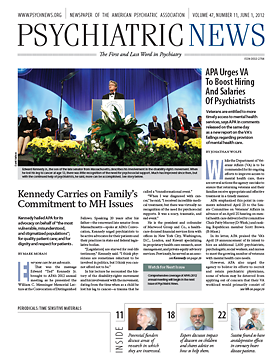For my first column as your member-in-training (MIT) trustee, I’m writing to introduce myself and describe some goals for the coming year.
I’m in my final year of residency at the University of Washington, and next year I will continue on to a research fellowship in psychiatric brain stimulation. I have long been working to increase the voice of psychiatry residents within APA and organized medicine in general and to help make medical societies a force for high-quality, evidence-based care. I hope to keep doing these activities this year as your MIT trustee.
In my campaign for the MIT position last year, I promised to focus on developing more opportunities for involvement of residents in APA and better communication to you from your leaders.
APA is full of opportunities for MITs, but this often leads to our being isolated in different “silos,” in which resident-advocates can’t communicate easily with their peers in an effort to work together on common issues. Over the past year, my predecessor as MIT trustee, Sarah Johnson, laid the foundation for the establishment of the Caucus of Members-in-Training (CoMIT), a group that will bring together leaders from the APA Assembly, the APA fellowship programs, and the Board of Trustees to address common issues. CoMIT has had quarterly conference calls this past year, and our first serious in-person meeting was held at the APA annual meeting last month in Philadelphia. With some generous donations from the Jefferson residency program, we were even able to provide dinner for attendees, which I hope we can continue next year in San Francisco.
One of my top priorities this year is to develop CoMIT into an active and coordinated force for MITs within APA, so that all your leaders are working in unison to help this organization better serve you. Even more importantly, the caucus will be a place for any trainee who is interested in leadership in the Association (or even just understanding how APA governance works) but hasn’t secured any formal office to make a contribution to the organization. By identifying and mentoring those of you who want to be more involved in APA, I hope to help prepare a top-notch crop of leaders for the years ahead.
The other thing you can expect from me this year, as promised, is communication. Both your MIT trustee-elect, Erik Vanderlip, and I believe that APA needs to start communicating through many different channels to effectively reach tomorrow’s psychiatrists. There is this column, for example, and if APA has your e-mail address, you’ve probably received a message from me. This year, we hope to go beyond that. There’s an APA MIT group on LinkedIn where I’ll be posting updates, and we may shortly be on Facebook, where there’s already a general APA page. My personal Twitter feed is @AlikWidge, where I post updates on APA business, but also on my research and work with the Accreditation Council for Graduate Medical Education. In addition, Psychiatric News Update, the electronic newsletter e-mailed to members each Wednesday, contains valuable information for MITs about APA programs and opportunities.
Finally, we as psychiatrists know that no amount of electrons can match the value of face-to-face conversation. As I travel this year for conferences and interviews, I hope to hold “roundtable” meetings to gather your feedback about how we can better serve you. At the July Board meeting, I’ll be asking for funding for those meetings and will report back to you in late summer.
In future columns, I will have some updates on new developments in residency accreditation and board certification and thoughts on major strategic decisions facing APA. In the meantime, if you’re interested in joining the caucus list or otherwise have a question for me, please drop me a line at
[email protected]. Input from members is essential to help me do my job!

Alik Widge, M.D., is a PGY-4 resident at the University of Washington.

